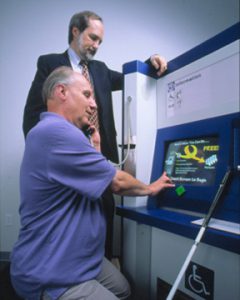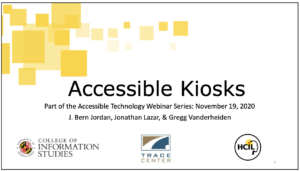Kiosk Accessibility
This development project is funded by Inclusive Information and Communications Technology RERC (90REGE0008) from the National Institute on Disability, Independent Living, and Rehabilitation Research (NIDILRR), Administration for Community Living (ACL), Department of Health and Human Services (HHS). Learn more about the work of the Inclusive ICT RERC.

Director Gregg Vanderheiden watches user with a vision impairment use a kiosk featuring EZ Access
What is the purpose of this project?
The Trace Center has developed and been continuously improving a set of cross-disability strategies and guidelines for kiosk accessibility, including both hardware and software strategies that have enough flexibility for the wide variety of kiosk types and uses.
Its current work is focused on the development of a set of unified guidelines for kiosks and other closed ICT products in collaboration with industry, consumers, and academia that could be a basis for policymakers’ future standards work.
- These devices are used in many different settings and for many different purposes (e.g., to access bank accounts, check in to hotels, buy train tickets, or order lunch at a restaurant). But the specific hardware and software standards that will work and apply to kiosks do not exist.
- There are a number of different laws and standards in the United States and in other countries, but developing one set of guidelines is critically important so that all users have equal access to the kiosks they encounter in their everyday lives, and manufacturers have a single standard to which they can design their products.
- We are working on compiling all of the accessibility guidelines that might apply to kiosks, as well as information about the basic approaches that can be used to make kiosks accessible, a compilation of all regulations, a unified checklist for kiosk accessibility, and a compilation of all known accessibility packages and tools along with how they address the checklist.
Impact on the lives of people with disabilities
Kiosks are widely used throughout society for everything from banking to travel to health care.
- Kiosks often provide the only way (or the most efficient way) to provide a service.
- They are used by a wide variety of users, with a wide range of abilities, and who may have never used them before or only use them infrequently.
- Kiosks are often found in noisy places that are full of distractions.
- And they sometimes require personal data that users need to keep private.
Currently different US laws apply to kiosks used for different purposes. For example, the Air Carrier Accessibility Act applies to airport kiosks, the ADA to kiosks at restaurants, while the Help America Vote Act applies to kiosks used for voting. Having one set of standards and guidelines is necessary to ensure kiosk accessibility for people with disabilities and to provide a sane development environment for companies.
Trace has a long history of working to improve accessibility of kiosks.
The EZ Access keypad developed by Trace in the late 1990s has been implemented by kiosk manufacturers and is currently serving the public in thousands of locations, including United States Postal Service kiosks across the country, kiosks at parks, museums, and memorials including the Smithsonian Institution and the U.S. National World War II Memorial, as well as in commercial locations such as the Mall of America. You can watch this simple demo of EZ Access to see how it works.
Now Trace is moving beyond the development of specific technologies to ensure kiosk accessibility to working with others to develop a set of unified standards and guidelines for kiosk accessibility.
This project has resulted in the following Publications and Presentations
Principal Investigators: J. Bern Jordan, Gregg Vanderheiden- Lazar, J., Jordan, J., Vanderheiden, G. (2019). Towards unified guidelines for kiosk accessibility. ACM Interactions, 26 (4, pp. 74-77). https://doi.org/10.1145/3337779
- Read this article.
Accessible Kiosks, webinar, November 19, 2020, a presentation for the Great Lakes ADA Center


